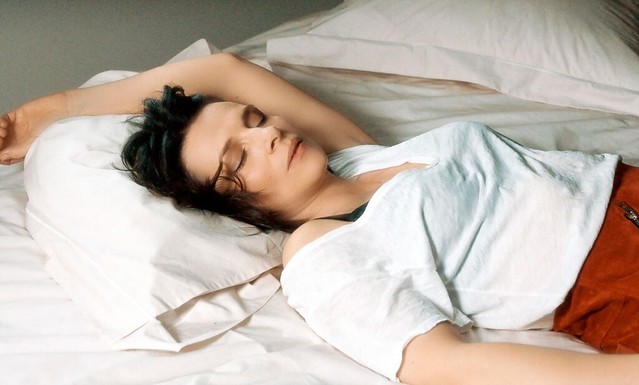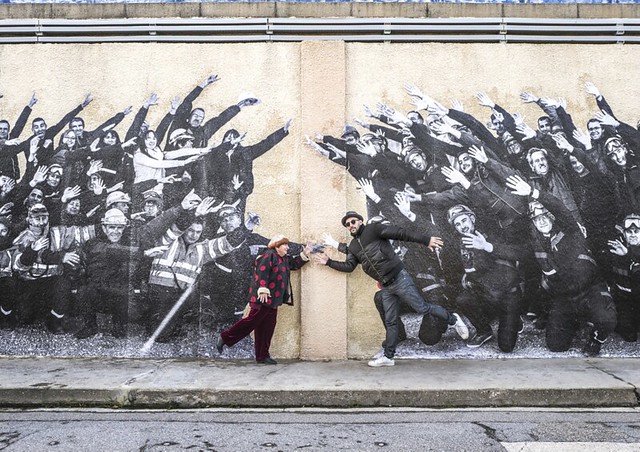
I think Claire Denis has been hanging out with Hong Sang-soo a little too much because I never expected her to do a wordy romantic comedy! And the result is delightful! It boasts the best rolling end credit of any movie ever.
Let the Sun Shine In concerns middle aged divorcée painter Isabelle (radiant Juliette Binoche). The film starts with her having sex with her regular lover, Vincent (Xavier Beauvois), a portly, pompous banker with terrible bedside manner. Some off-handed comment he says makes her cry. In fact, our disheveled heroine cries a lot, out of loneliness, in bed at night alone. Vincent is a married man and constantly says he won't ever leave his wife and family. He just want to bang her regularly is all.
Then there is a brooding stage actor (Nicolas Duvauchelle) Isabelle hits up on at the bar. They are about to work professionally together. But she is very anxious to know if he's interested in her as much as she is in him. But he rambles on about his acting, his identity whatev, finishing what seems to be his 15th beer. After hilarious and super awkward exchange in the car, Isabelle pretty much passive-aggressively makes him to 'come up for coffee' and stay the night. The next day, she is super happy about what happened but he's not. He's full of regret.
Then there is François (Laurent Grévill), Isabelle's ex, whom she has a 10 year old daughter with. She constantly regrets that she left him. He sometimes comes over and they screw. But they say some hurtful things to each other. They go their separate ways unhappy.
Always on the verge of tears, she confesses to her friend that she is deathly afraid that she'd pass the age to meet the love of her life, that she'd live the rest of her life alone and die alone. Easily swayed by other's opinions, whoever she meets, she asks for advice and second guess herself if she's doing the right thing.
Frustrated with her current relationship arrangement, Isabelle takes a trip to the countryside with her art circle acquaintances where they are invited to a little art festival. While taking a walk with the group, their pompousity and forced social niceties become too much for her and she blows up on everyone. Yet she finds herself in the arms of a soulful country bumpkin on the dance floor. Would that fling last?
We've all been there. The relationship is a fickle business and there are no easy answers. As you grow older, the need for companionship grows. Loneliness is a terrible thing. In a rom-com setting, Isabelle embodies a middle aged woman in the city dealing with these issues perfectly. With co-writer Christine Angot, Denis wrote a very funny script and created a very funny character that is unlike anything she created previously. The only comparable film she made would be Friday Night (2002). But that was a mood piece more than anything else with little dialog.
Since it's shot by the great Agnes Godard, Let the Sun Shine In is filled with gorgeous close-ups. As the arresting images unfold with jazzy soundtrack (by Stuart Staples of Tindersticks), you are safely in Denis territory. And the familiar faces show up - Alex Descas plays one of Isabelle's lover to be (there is a lot of potential), Valeria Bruni Tedeschi briefly shows up too.
The biggest suprise, figuratively and literally, is the appearance of Gerard Depardieu as a fortune teller who's motives are suspect. His long, meandering exchange with Isabelle got hearty laugh from me.
After a couple of very dark films (White Material and Bastards), Denis is trying something different. Let the Sun Shine In feels much looser and lighter than her other films but it still retains all of her visual language and style. With her announced English Sci-fi project with Robert Pattison, I welcome this change. Someone please give this woman a best director prize already!
Let the Sun Shine In plays as part of NYFF 2017 at Film Society of Lincoln Center on 10/7 and 10/8. Please visit FSLC website for tickets and more information.
